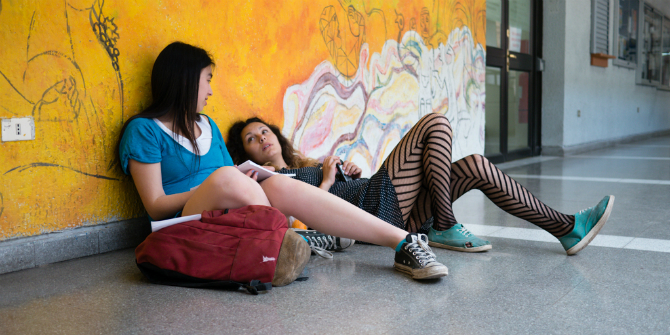Bringing Social Media Into the Curriculum: New Ways of Teaching and Learning?
April 11, 2017
PROJECTS: Preparing for a Digital Future
TAGS:
Laura Pountney reflects on new ways of teaching and learning, where social media platforms have become part of A level sociology and anthropology curricula. Laura is a teacher of anthropology and sociology at Colchester Sixth Form College, senior examiner for A level anthropology, and author of several textbooks. She has been involved with curriculum development, teacher training and projects such as the UCL Why We Post research.

Image credit: F. Osorio, CC BY 2.0
Many parents are interested in how their children understand the world around them through social media. This discussion is now entering schools through new curricula at A level. Until recently, further education only addressed social media platforms through media studies, or as part of college-wide pastoral programmes that tended to focus only on online safety. Students aged between 16 and 18 are among the most prolific users of some platforms, and are therefore uniquely placed to understand and evaluate its role in their own lives and beyond.
Social media in A level curricula
The A level anthropology specification was developed and accredited in 2010, an exciting and ground-breaking event, not least because it has never been taught in the UK as part of the pre-university curriculum. It also has a distinctly contemporary approach, requiring students to engage with cutting-edge themes including cyberethnography, and to consider the role of social media in creating and maintaining relationships and identity.
As with many A levels there are core themes running throughout the course, such as the role of technology. This provides scope for teachers and students to consider the ways in which technology changes our lives, what it makes possible, and how it may be an extension of humanity.
The curriculum also explores the role of social media in creating alternative identities. In teaching personhood, identity and cyborgs, the ethnographic research of Tom Boellstorf is considered (carried out on the virtual world Second Life), as well as Amber Case’s provocative TED talk, which asks ‘if we are all cyborgs now.’
Danny Miller’s brilliant Tales from Facebook is used to look at how social media impacts our relationships. Miller finds that Facebook is simply an extension of the myriad of rich relationships that people have in their offline lives, and that the negative effects of social media such as cyberbullying are often overstated. The book even allows students to explore the cross-cultural experience of Facebook in Trinidad, where, for example, ‘to friend’ also means to have sex with someone!
With the internet being a global medium, students genuinely enjoy considering the role of social media in people’s lives in other parts of the world, so it is no surprise that the UCL-based research Why We Post, led by Miller and his team of nine anthropologists, is really useful. Their website comprises an online course (MOOC) and a wealth of information and, perhaps most excitingly, a range of short YouTube videos asking questions like, ‘what is anthropology?’, as well as some beautiful, funny and insightful short clips that reveal the role of social media for people in the field sites all over the world. These all feed exceptionally well into the overarching debate in anthropology concerning human universality and diversity.
In sociology, traditional forms of media are compared with new forms of social media, such as the ways that new forms of social media allow greater audience participation, and considering ideas such as citizen journalism and churnalism. The role of social media is also considered within crime and deviance, and the topic of beliefs in society – how social media is playing an increasing role in how people participate and practice religious beliefs today, and how it may contribute to facilitating social change.
The exam board, OCR, now firmly situates social media into their reformed curriculum, with a whole section of the specification focusing on two key questions: What is the relationship between globalisation and digital forms of communication? And what is the impact of digital forms of communication in a global context? These translate into several exam questions in their final assessment.
A whole array of resources is available as well as a chapter of the new course textbook. This revised curriculum really brings the subject up to date, and in many respects provides a much closer link to university courses, which, in relevant disciplines, are increasingly incorporating similar themes within their undergraduate courses.
The response of teachers and students
In teacher training sessions, teachers were initially a little overwhelmed by the notion that they might have to ‘teach’ social media, and it took some time to reassure them that they did not need to be experts in social media; rather, they needed to familiarise themselves with the sociological and anthropological debates. Most relished this process, able to draw on their students’ experiences in ways that are simply not possible in other areas. For example, one teacher states that
this is such a great way to bring sociology into the present … studying social media is so relevant and gives students a new way to apply their theories and concepts which they can directly relate to.
Students are genuinely interested in how social media is used in other cultures, with one stating that
we love learning about how other people use social media because this is something we don’t ask ourselves, anthropology really gets you thinking about how we are all so different and yet the same.
Students are then able to self-reflect on the significance of social media in their own lives and of those around them, becoming aware, for example, that for many young people where there is less formalised education, access to social media is transformative and educational.
Being able to apply sociological theories and concepts to something that plays such a fundamental role in their own lives is powerful, and students have a great opportunity to consider and question the impact of social media on their own lives and relationships in a critical, mature way.
Although one concern raised by teachers was the danger of students becoming anecdotal or commonsensical in their writing and thinking about social media, this has not been the case. One teacher commented that
students really begin to understand how relevant social theories are when they apply them to social media.
Social media as an innovative teaching and learning tool
There are benefits to including social media in curricula, which raises the question of its further inclusion across all subjects. The discussion could also be opened up about what social media means to young people. Future planning and discussion concerning education at A level must also explore more fully the potential of social media as an innovative teaching and learning tool, both inside and outside the classroom.
NOTE
This article originally appeared on lse.ac.uk. It has been re-posted with permission.

